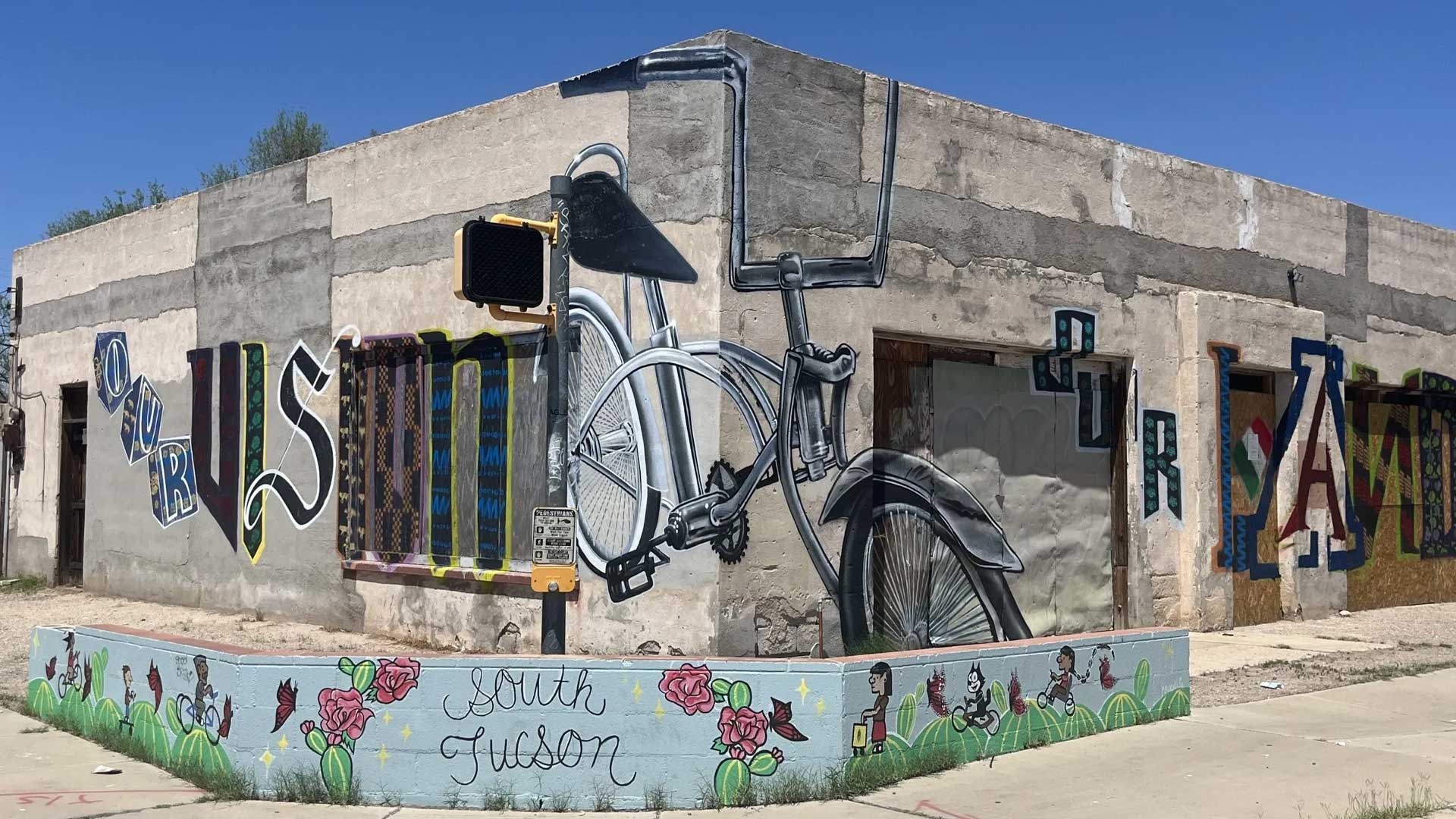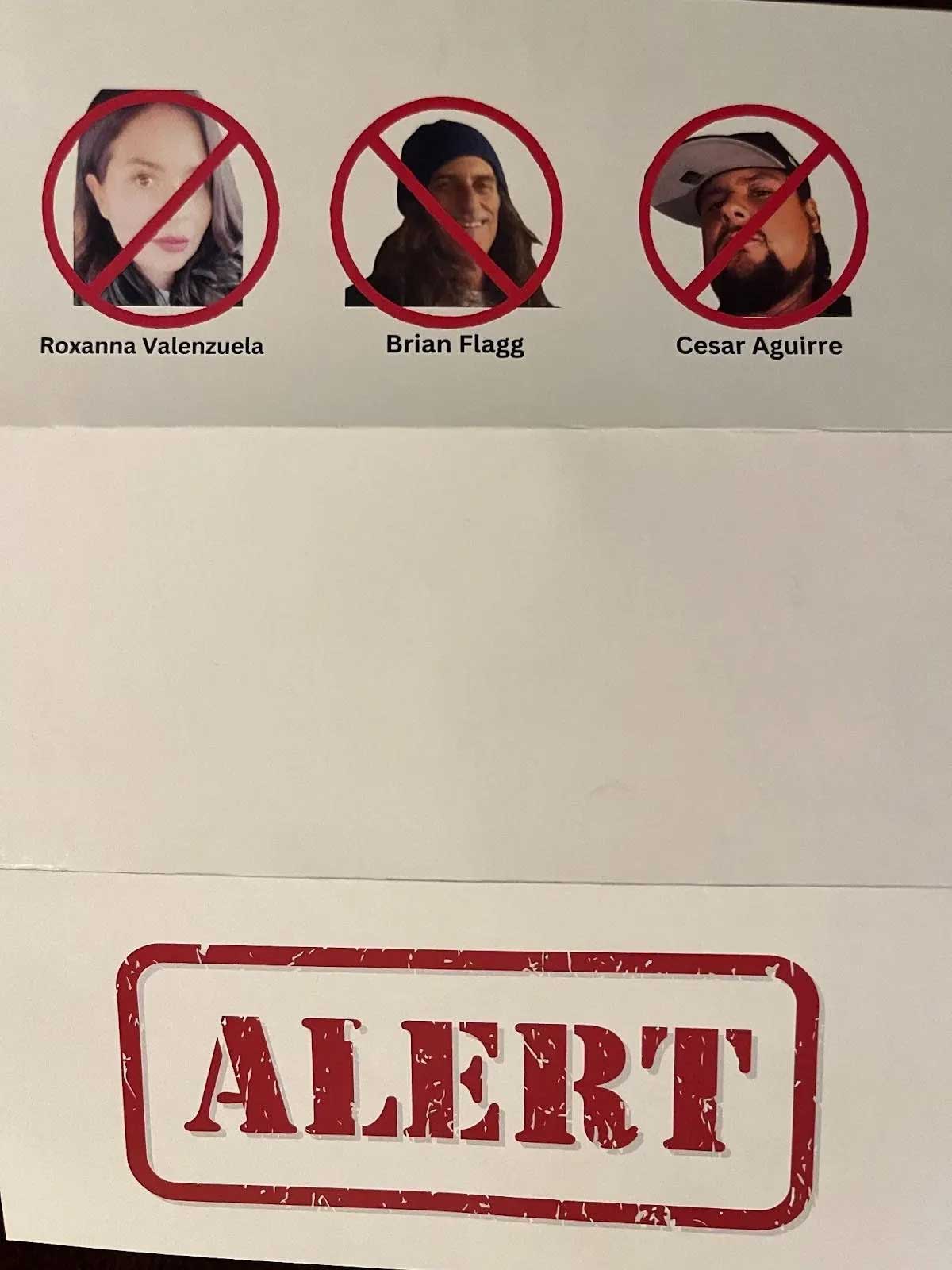 Known as "The Pueblo Within a City," South Tucson is 1.2 square miles and was incorporated in 1940. Its population is 4,613 as of the 2020 Census
Known as "The Pueblo Within a City," South Tucson is 1.2 square miles and was incorporated in 1940. Its population is 4,613 as of the 2020 Census
Originally published on AZ Luminaria on July 25, 2025.
In the first week of July, residents of the 1.2-square-mile city of South Tucson received fliers in their mailboxes with the crossed out faces of Mayor Roxanna Valenzuela and city council members Brian Flagg and Cesar Aguirre.
The accompanying letter started “I want to begin by thanking every one of you who took the time to sign the recall petitions. Your voices were heard and because of your efforts, Roxanna Valenzuela (173 valid signatures), Brian Flagg (163), and Cesar Aguirre (163) have officially been recalled, and their seats are now vacant.”
 VIEW LARGER The South Tucson recall mailer.
VIEW LARGER The South Tucson recall mailer. That statement was not true. No one had been removed from office, only a recall election had been scheduled. The misinformation quickly sparked outrage and concern during the city’s July 1 council meeting.
“I'd like to ask somewhere that somebody give me a straight answer as to why a member of your governing body can get away with spending money and actually telling lies,” Dan Eckstrom, a South Tucson resident and former Pima County supervisor, said during a July 1 meeting.
Behind the recall was Paul Diaz, who has a long, and costly, history with recall elections in South Tucson, both as a target and an initiator. A former mayor and current council member, Diaz also launched a recall in 2018. That recall plus this current one has cost the tiny city, which is already struggling to fund its own fire department, more than $17,000.
City prepares for costliest recall election
The upcoming all-mail recall election, scheduled for Aug. 5, marks South Tucson’s third in 10 years, and its most expensive.
In South Tucson, voters do not elect a mayor directly. Instead, they vote for individual city council members, and once the new council is seated, the members select one of their own to serve as mayor. This means the mayor is chosen internally by the elected council rather than by a separate mayoral ballot.
On July 1, the Pima County Board of Supervisors approved an intergovernmental agreement to administer the election. Under the agreement, the city will pay the Pima County Recorder’s Office $12,000 for services including signature verification and ballot mailing — more than double the combined cost of two previous recall elections, which totaled $10,800.
Write-in candidates
Diaz supported three candidates, Anita Romero, Eduardo "Lalo" Baca, and Christopher Dodson, for replacement but their campaigns hit a snag.
How to vote
Election day is Aug. 5 and this is an all mail special election.The Pima County Recorder’s Office recommended deadline to mail back ballots is July 30. Election calendar and information from Pima County
“Unfortunately, due to a technical filing error on my part, the nomination petitions for our three replacement candidates… were deemed insufficient. As a result, their names will not appear on the official ballot,” Diaz wrote in the early July flier that incorrectly stated the current officeholders had been recalled.
Now, voters must write in their desired replacement candidates on their recall election ballot. Their names appear on the write-in candidate list.
Diaz’s support hinges on the three candidates being South Tucson residents. While Romero and Baca have lived in South Tucson for decades, Diaz admits Dodson has only lived in the city “for a year or something.”
Nonetheless, voters will have to decide whether to recall Valenzuela, Aguirre and Flagg as well as write-in who will replace them.
Recall led by former mayor
Diaz claims the three officials being targeted are aligned with special interests and have failed to prioritize the city’s needs.
He says the actions of the current council have led to a spike in crime, harmed local businesses, and compromised the integrity of local government.
The other council members deny his accusations.
“That special interest, of course, is the fact that they want affordable housing and forgot about economic development,” he said. “So we're in crisis mode right now as a city because of the fact that the majority of the council did not want to follow economic development first and then do affordable housing next,” he said.
Diaz has also accused Mayor Valenzuela of violating residency laws by allegedly living outside city limits while running for office — an allegation she denies.
“Former mayor Paul Diaz claims that I'm ‘serving illegally’ because he claims I live outside the city. This is simply untrue,” Valenzuela told Arizona Luminaria over email. “I proudly live at the Arizona Motel, where I've led an effort to renovate and make it safe for low-income families. After clearing the motel of crime, I am proud to raise my daughters there. This is my home, and I am deeply invested in the well-being of this community,” she told Arizona Luminaria over email.
Diaz has leveled additional accusations against all three elected officials. He opposes Valenzuela’s support of outsourcing the city’s fire department and plans to expand services for people experiencing homelessness.
He also accuses Flagg of manipulating the interim city manager and helping Valenzuela misrepresent her address. Meanwhile, Diaz claims Aguirre allowed the false address to be used and is motivated by hidden interests.
Aguirre called the accusations “unfounded” and politically motivated. “These are personal attacks,” he told Arizona Luminaria. He said in all of Diaz’s time on the council and as mayor he “has failed to address any of the issues we’re facing including the lack of revenue to properly fund our fire department, the increasing crime rate, and protecting our residents from the negative effects of gentrification.”
Flagg did not respond to Arizona Luminaria’s request for comment but Flagg told KGUN9 he wished Diaz would join the trio in addressing issues facing South Tucson “instead of [doing] petty, stupid like like things to just bad mouth us.”
A history of recalls in South Tucson
Diaz is no stranger to recalls.
In 2015 he was recalled as mayor of South Tucson following claims he “failed to uphold his campaign promises of transparency and public safety and is taking actions that are detrimental to South Tucson,” according to KOLD.
Out of the 1,931 registered voters in South Tucson, 398 cast their ballots to oust Diaz.
Diaz reclaimed a position in local government in 2018 when he launched a recall election against Mayor Ildefonso Green and council members Rufino Cantu, Robert Larribas, and Carlos Romo. Diaz and four other candidates were elected to replace the recalled officials.
“There was nothing that they understood about government or city elections or anything,” Diaz said about the reason he pursued the recall.
The 2018 recall drew an even lower participation rate than 2015 with 1,983 registered voters and 308 ballots cast.
South Tucson, the “city within a Pueblo” has 4,613 residents, according to the 2020 census, 2,433 registered voters and an annual budget of $1.6 million for 2026, according to the city budget.
Diaz said he would not seek another recall if Valenzuela, Aguirre and Flagg were not recalled in the upcoming election.
“But I'll sure fight against them during the election,” he said.
This article first appeared on AZ Luminaria and is republished here under a Creative Commons Attribution-NoDerivatives 4.0 International License.

By submitting your comments, you hereby give AZPM the right to post your comments and potentially use them in any other form of media operated by this institution.